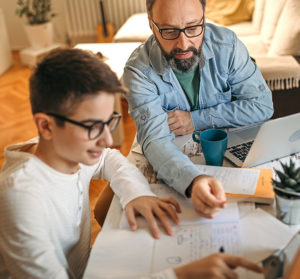How Foster and Birth Parents Can Work Together Toward Reunification

Children have the best opportunity to thrive when they grow up at home with parents or caregivers, but that is not always possible for a wide variety of reasons. “When a child is removed from their home and placed in foster care, the goal is always to reunify that child with their birth family,” says Lucy Ajuoga, Clinical In-Home Supervisor for KVC Nebraska.
Reunification may begin when a safety risk is eliminated, when home services are put in place, when housing is settled or other resources for the family are accessed. At KVC Nebraska, we come in and help with many of those things to help children return home when it is deemed safe. In 2020, KVC Nebraska safely reunified 60 youth with their families after time in foster care.
Learn how KVC helps promote safe family reunification.
June is National Reunification Month, and we’re excited to share more about how foster and birth parents can work together toward reunification. It’s all about establishing the best possible future for children and families.
“It can be traumatic to be removed from your home, your family, your routine and everything you know,” Lucy explains. “So it’s an important role for foster parents to maintain a relationship with the biological parents. Maintaining this relationship helps youth maintain a sense of identity and belonging (including culturally), demonstrates strong communication, shows them how to have a strong relationship and so much more.”
Eight Ways Foster Parents Can Reassure Birth Parents
Managing the foster and birth parent relationship is an important part of foster care and reunification. By reassuring birth parents about the safety and care of their child, this relationship can be one of trust. Consider these helpful ways to reassure birth parents:
- Determine the best means of communication with birth parents. Case workers can help foster parents understand what kind of communication methods and/or visits are appropriate.
- Encourage the child to contact their birth parents. Help children create pathways for regular, ongoing communication when appropriate.
 Share updates and pictures when possible. Sharing updates from the day-to-day can help birth parents remain connected and involved. It doesn’t have to be groundbreaking. Even sharing about a child’s favorite subject in school can keep that bridge strong.
Share updates and pictures when possible. Sharing updates from the day-to-day can help birth parents remain connected and involved. It doesn’t have to be groundbreaking. Even sharing about a child’s favorite subject in school can keep that bridge strong.- Help children and birth parents connect on special days. From birthdays to holidays, these special moments can be especially challenging for children and birth parents to be apart. In a way that’s safe and appropriate, help children stay connected. Crafting and sending special birthday cards can be a fun, meaningful way to connect.
- Save school projects, art pieces and other creations to share. These “slices of life” help birth parents see how their child is learning and growing and feel connected to their education.
- Join a support group of foster parents. Foster families need support too! Other foster parents, who have been in your shoes before, can share ways they’ve stayed connected to birth parents.
- Keep journals about activities and share with birth parents. Especially if birth parents aren’t in a position where regular contact is appropriate, keep a journal with notes about the child’s day-to-day. The journal can be shared with birth parents later.
With these strategies and more, foster parents can build positive relationships with birth parents. This connection will support children and reunification efforts.
How Foster Parents Can Build Relationships with Birth Parents

It’s vitally important for foster parents to maintain a relationship with biological parents. Keeping in contact with birth parents can ease the trauma of being removed from their home. This also gives young people a sense of identity, cultural background and family history.
Here are some tips for foster parents to build strong relationships with birth parents:
- Maintain traditions, like going to church or attending cultural events. Doing this demonstrates to birth families that their culture and traditions are respected and important.
- Invite biological parents to events and outings when possible. When it’s safe and appropriate, this can be a good way to build a connection together.
- Be open to birth parent suggestions and ideas. As much as you can, stay receptive to feedback and ideas from birth parents — this can be deeply encouraging and validating!
- Stay empathetic and practice active listening. There will be bumps in the road and times when the relationship is challenging, of course. But staying empathetic and consistent can make a big difference over time.
With these strong relationships, we sometimes see families continue to keep in touch after reunification. Foster parents can become extended family. You can learn more in this guide about partnering with birth parents to work toward reunification.
Reunification at KVC Nebraska

All children deserve a safe and loving home. Unfortunately, there are times when caregivers cannot fully meet a child’s safety needs and it becomes necessary to temporarily remove the child from their home. When this happens, our goal is to help caregivers and children reunify by enhancing protective factors and reducing the risks that led to the need for foster care.
We help biological families ensure a safe and stable environment, learn important parenting skills and practice with a transitional period. Children may experience many changes during reunification, including attending a different school and participating in different activities. Taking time to transition helps families ease into what may be a big change in a child’s life.
KVC uses a Safe & Connected model to put the focus on child welfare. With this research-informed model, we build on a family’s strengths and correct weaknesses to support reunification efforts.
We are proud to help reunite birth families. Learn more about reunification at KVC Nebraska.

